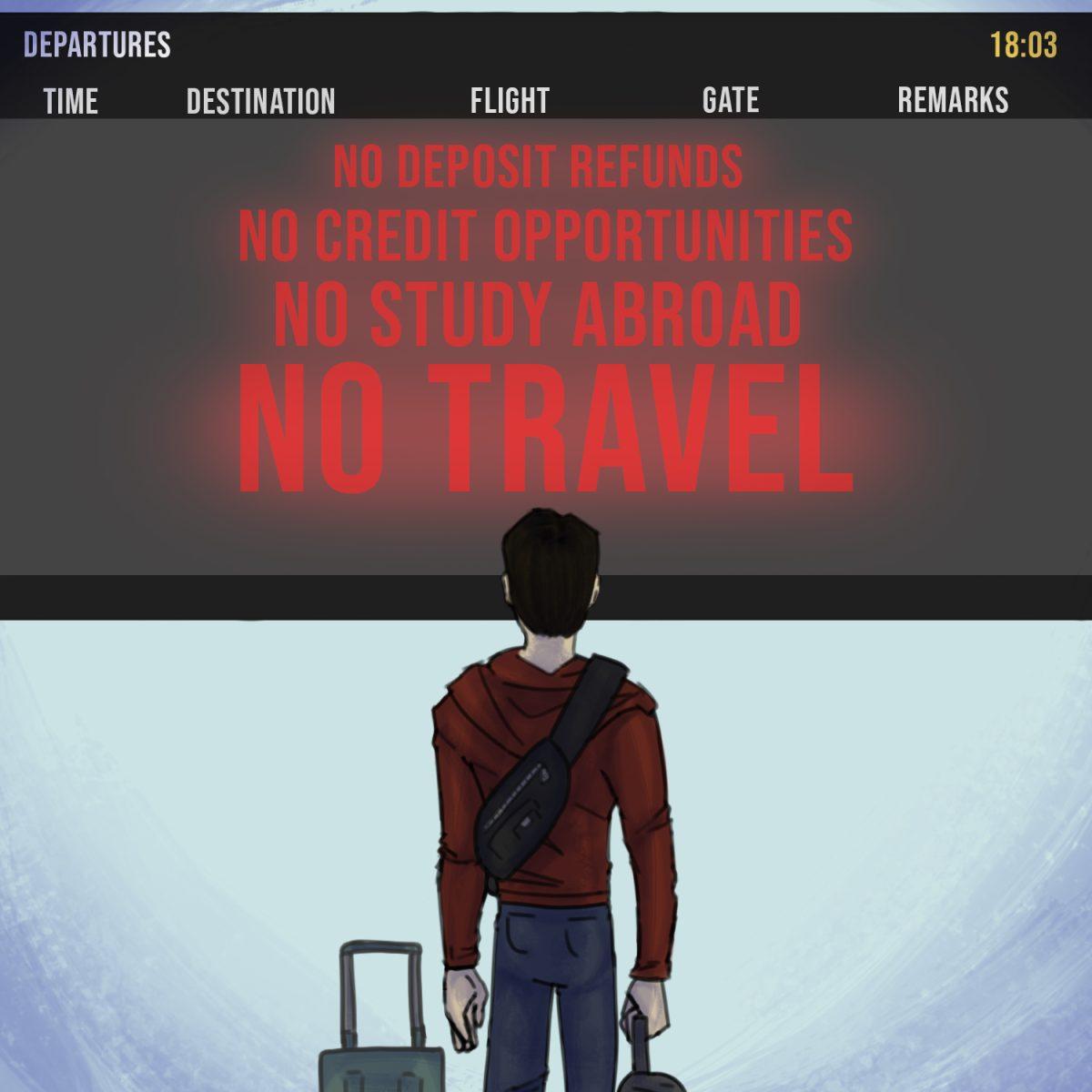
Graphic by Astrid Hernandez | Mercury Staff
University
officials recently made the decision to suspend all international travel
through the calendar year due to the coronavirus pandemic.
This policy change
cancelled all summer, fall and winter 2020 study abroad programs, according to
a university-wide email sent by the Education Abroad Office to all prospective
students traveling internationally.
“We
understand that this may be very difficult and disappointing for you,” the
email stated. “Be assured that this decision was not made lightly. The
safety of our UT Dallas travelers is our number one priority.”
In an email
statement to ****The Mercury****, Education Abroad advisor Alissa Qualheim said
the office’s goal remains to continue to provide students with the best
services and opportunities possible at this time.
“Obviously, like the rest of the world, there
has been a shift in our day-to-day operations this past month in dealing with
COVID-19. We are communicating any changes as quickly as possible so that
everyone is informed and can plan accordingly,” the email statement said.
“These are uncertain times, and unfortunately, no one knows when this pandemic
will end. But with everyone playing their part and following CDC guidelines, we
are hopeful that we can again provide our students with an array of
international opportunities.”
Students already abroad for the spring semester faced
numerous difficulties. For marketing sophomore Kiera Quinn, her stint at the
Vienna University of Economics and Business in Austria was cut short as all UTD
students were called back from their respective countries in March. She said
that she was denied not only the full extent of her travel experience, but also
her academics as classes transitioned to online. She also could not get out of
her apartment lease and is currently paying for a vacant apartment.
“When I first found out I had to leave, the next few days
were spent just trying to figure out what to do next,” Quinn said. “I was given
less than a week to leave and I had to arrange quite a bit in quite a short
amount of time. It was a lot of stress. I didn’t know if I was going to have to
pay my scholarships back or if I would be in good standing with AES because of
its hour requirement. I had to shut down my Austrian bank account, which took three
to four hours in and of itself. All of the money I spent on furnishings and
school supplies was wasted, as I had to throw most of it away.”
Students who had been planning to study abroad
expressed their disappointment at losing their opportunity to travel through
the university. For biology senior Sana Suhail, missing out on her study abroad
meant losing out not only on travel experience but on course credits as well.
“I was supposed to do an exchange program at Waseda
University in Tokyo,” Suhail said. “I had honestly planned my entire four years
of college around doing a study abroad in the spring of my junior year. I was
really looking forward to the classes I would take there. Now, I’ll have to
take decidedly less interesting summer courses to make up for the coursework
I’ve lost in the spring.”
Suhail said she had already paid for her flights, her housing deposit, first
month’s rent and almost finished packing her bags. Though she hadn’t left the
US at the time of the travel suspension notice, she lost about $1,000 in
nonrefundable flight fees and housing deposits. But, Suhail later realized the
consequences of the travel suspension went further than just monetary loss.
“I took my MCAT a week after I found out about the
cancellation of the program,” Suhail said. “I was honestly such a mess and had
a really hard time concentrating on studying. I’m still waiting for my score to
come back and am pretty worried about how my performance must have been
impacted by the emotional and mental toll of dealing with the cancellation. I
had to make phone calls to cancel flights, talk to my advisors, etc., which,
although not time-consuming on its own, was pretty draining and further
distracted me from my studies.”
The process of
planning for study abroad began early in the year with forms and deposits due in
advance. Assistant Dean of the School of Economic, Policy and Political
Sciences Carol Lanham, planned on spearheading a faculty-led course in
sociology in Paris, though much of her preparation did not come to fruition.
“I spent the late summer and early fall getting
approval from the Provost’s office for the study abroad program,” Lanham said.
“I also spent a significant amount of time marketing the program to students.
In addition to hosting formal study abroad fairs, I also organized
informal information sessions. My colleague, Dr. Richard Scotch, who was also
planning to teach with me in Paris, met individually with students to discuss
independent study options.”
Lanham said she also planned to visit Paris around spring
break to finalize plans for the upcoming June course, but worried she would
face travel delays returning home, she opted not to go as a precaution.
“Some of my travel expenses were refunded, while others
were not,” Lanham said. “Fortunately, the (International Center)has been
handling matters related to the cancellations. I am grateful for their assistance.”
The International Center handles most of the organizational
work for university-sponsored international travel and has been working
alongside the Bursar’s Office to handle the cancellations. This includes refunding
deposits and working with students to ensure that there is no confusion on the
logistic and monetary side of things.
Though this international travel suspension has created
many obstacles for various people participating in the study abroad experience,
Lanham said she’s looking toward the future.
“While I am
disappointed that we will not be able to travel abroad this summer, I
am optimistic that we can resume normally once the public health threat has
passed,” Lanham said.